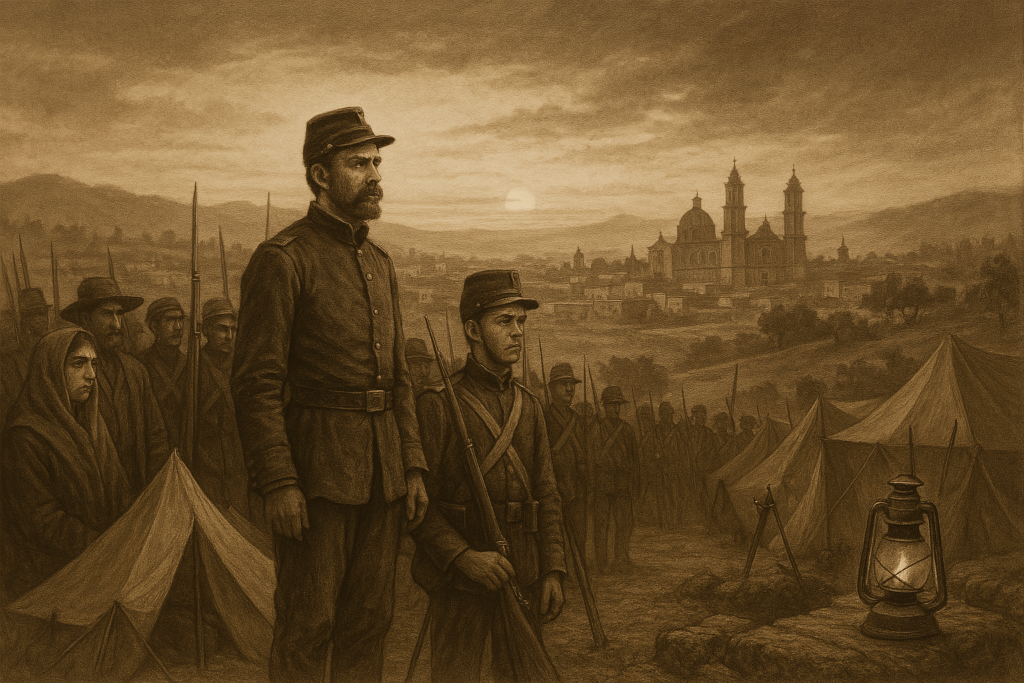*“In the midst of fierce adversity, courage becomes the compass that guides us home.”*
It was a hazy morning on May 5, 1862, when the muted light of dawn stretched over the rugged hills of Puebla, Mexico. The air shimmered with both the chill of early spring and the tension of an imminent clash—a battle poised not only to defy the might of an advanced European power but also to ignite the spark of a people’s independence. In the quiet before the storm, each soul sensed that their struggle transcended mere warfare. It was an assertion of dignity, the manifestation of determination, and the call to honor the legacy of generations that had dreamed of freedom.
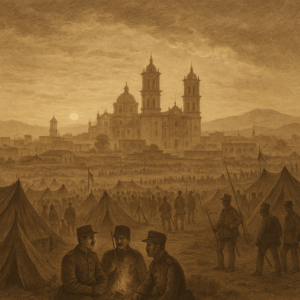 ## I. The Awakening of a Nation
## I. The Awakening of a Nation
As the first rays of the sun crept over the horizon, whispers of prayer and hope filled the camp. Soldiers—farmers, artisans, and townspeople alike—gathered to face an enemy that, on paper, seemed invincible. Among them was Captain Esteban, a weathered veteran whose deep-set eyes shone with a calm resolve. His hands, calloused by years of working the earth, now gripped a well-worn musket. Yet, it was not just the weapon that stirred awe in his comrades but his unwavering belief that every drop of sweat and tear shed in defense of their homeland would write a new chapter in their collective destiny.
A few paces away, General Ignacio Zaragoza—a visionary leader with both tactical acumen and an unbreakable spirit—huddled over a hastily drawn map. In the dim light of his lantern, his eyes danced over each line and contour, every mark a promise of planned strategy and careful calculation. His is the soul of a nation that had learned to trust not in the abundance of firearms or the sophistication of enemy artillery, but in the unity of its people and the strength of conviction.
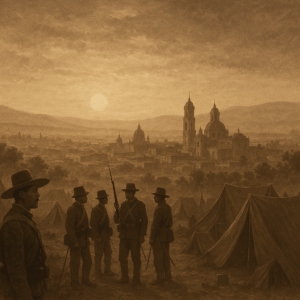 In Puebla, traditional beliefs intermingled with the fervor of patriotism. Old tales recounted how the land itself had nurtured heroes from humble beginnings. That morning, as every soldier stared into the brightening sky, they felt the ancestral call of the soil: a reminder that resilience and perseverance were gifts passed down through centuries. Every heartbeat carried the hopes of families, the echo of past sacrifices, and above all, the resolute demand for self-determination.
In Puebla, traditional beliefs intermingled with the fervor of patriotism. Old tales recounted how the land itself had nurtured heroes from humble beginnings. That morning, as every soldier stared into the brightening sky, they felt the ancestral call of the soil: a reminder that resilience and perseverance were gifts passed down through centuries. Every heartbeat carried the hopes of families, the echo of past sacrifices, and above all, the resolute demand for self-determination.
The memory of oppression, of foreign armies stepping on their sacred earth, lent urgency to the assembly. The enemy—the French—had arrived on Mexican soil with a pomp and technological superiority that many had deemed insurmountable. Yet here, amid fading twilight and emerging valor, the Mexican forces rallied under the banner of hope. The legend of this day—later celebrated internationally as Cinco de Mayo—would eventually teach future generations that even the smallest spark of resistance could kindle a flame capable of sweeping away tyranny.
## II. The Morning of Destiny
As the day broke fully, each soldier took their position with a mix of trepidation and fierce determination. The distant rumble of the enemy’s artillery was like an ominous drum, heralding the arrival of a force whose confidence bordered on arrogance. Around the makeshift trenches and barricades, local villagers offered silent prayers and small tokens of good fortune—tiny crosses, beloved family heirlooms, and handwritten blessings tucked into the pockets of brave fighters.
In the strategy tent, General Zaragoza moved among his officers, his voice whispering urgent orders that carried both warmth and steely resolve. “Remember,” he called out, “we march not merely to defeat an enemy, but to safeguard the future of every child, every mother, and every father who dreams of living free.” His words, though spoken in a hushed tone, reverberated like a clarion call across the assembly.
The landscape around Puebla was both beautiful and brutal—a mosaic of rugged terrain, scattered ruins, and fertile lands that had known the cycles of war and peace. The fighting men drew strength from the familiar beauty of the land, knowing that every rock, every tree, each gentle breeze was part of the legacy they defended. It was in this crucible of hope and hardship that destiny was forged anew.
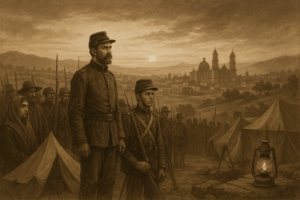 The morning was punctuated by adrenaline and adrenaline’s dance with fate. In hushed moments before the battle, memories of family, love, and dreams flashed through each mind like beams of radiant light. For Captain Esteban, a memory of his daughter’s laughter, free and unburdened, became his personal battle-cry. For a young conscript barely out of boyhood, the sight of his mentor’s unyielding gaze ignited a realization that true courage often arises from unexpected sources—a tender heart bolstered by the thunderous beat of legacy.
The morning was punctuated by adrenaline and adrenaline’s dance with fate. In hushed moments before the battle, memories of family, love, and dreams flashed through each mind like beams of radiant light. For Captain Esteban, a memory of his daughter’s laughter, free and unburdened, became his personal battle-cry. For a young conscript barely out of boyhood, the sight of his mentor’s unyielding gaze ignited a realization that true courage often arises from unexpected sources—a tender heart bolstered by the thunderous beat of legacy.
Before the French forces would draw near, every soul on the field was reminded that this moment—in which seemingly insurmountable odds had been challenged—was a fleeting chance to reshape history. With every inhalation of cool, dawn air, a silent commitment was made: failure was not an option, for every life, every story, hung in the balance.
The distant echo of the enemy’s approach soon grew into the thunderous rhythm of war, signaling that the hour of trial had come. Men donned their battered uniforms, checked their rudimentary arms, and steeled themselves for the battle that would become legendary—a battle where valor proved mightier than the most advanced artillery, where unified hearts overthrew the arrogance of overwhelming numbers.
## III. Into the Fray: The Clashing of Two Worlds
When the battle erupted, the clang of metal, the roar of musket fire, and the guttural battle cries melded into a chaotic symphony—a symphony that played on the edge of life and death. The French forces, with their precise formations and superior weaponry, pushed forward arrogantly. They expected an easy victory, an effortless conquest of a feeble resistance. Yet they were met with a force inspired by love of country, bred by centuries of struggle, and sharpened by the collective will of a people who had nothing left to lose but their chains.
The Mexican soldiers, though fewer in number and less equipped, stood firm. Their training might have been rudimentary compared to the professional ranks of the invaders, but the fire in their hearts burned with an intensity that no machine could mimic. Captain Esteban led his men through the smoke and chaos, making split-second decisions that saved lives and opened gaps in the enemy’s structure. Every movement was a dance with death—yet every dodge, every parry, was executed with a calculated determination. In that melee, history was being rewritten.
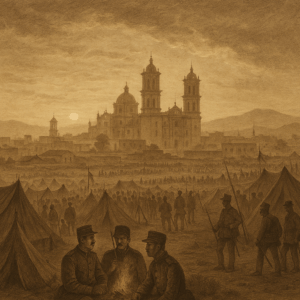 The clash was not merely a military encounter; it was a collision of ideologies. On one side stood an old-world empire that believed in the divine right of conquest, on the other, a rebellious spirit that demanded justice and self-rule. This epic struggle transcended the physical; it was a moral and spiritual battle. Each Mexican soldier, every tear and every scar, bore testament to an indomitable spirit. Their struggle became a symbol for every underdog, every small voice fighting against colossal injustice.
The clash was not merely a military encounter; it was a collision of ideologies. On one side stood an old-world empire that believed in the divine right of conquest, on the other, a rebellious spirit that demanded justice and self-rule. This epic struggle transcended the physical; it was a moral and spiritual battle. Each Mexican soldier, every tear and every scar, bore testament to an indomitable spirit. Their struggle became a symbol for every underdog, every small voice fighting against colossal injustice.
In the heart of the chaos, General Zaragoza’s strategic brilliance shone through. He identified weak points in the enemy’s advance, directing his men with commands that both inspired trust and sowed disorder among the French ranks. His hands, firm and precise, guided the battle’s flow like a master conductor channeling a tumultuous symphony. Each directive was a note in a melody of resistance—harmonious in its human dignity, yet discordant against the cold calculations of an empire determined to subdue.
In one fierce encounter amid the swirling dust and debris, Captain Esteban found himself face-to-face with a French officer. The duel was swift and silent, a microcosm of the larger battle. In that instant, the officer’s eyes glimmered with both regret and ambition—an ambition dictated by orders and ambition blunted by the overwhelming spirit of the Mexican cause. Esteban’s musket rumbled, and in one fateful moment, the duel ended. This personal battle was a fragment of the larger mosaic of victory, yet it encapsulated the determination and resolute honor that every soldier carried.
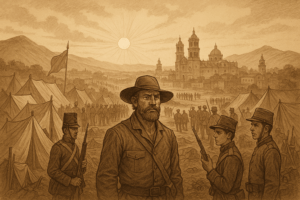 As hours passed, the tide of battle shifted. The initial shock of the French onslaught gave way to the realization that their technological edge could not outweigh the raw passion and resourcefulness of the defenders. The Mexican soldiers exploited every nuance of their surroundings—a fallen tree, a concealed ridge, the shifting winds—to turn the ring of attack into a circle of resistance. The fighting, brutal yet poetic in its display of human will, wore on with moments of despair countered by bursts of courage that electrified the battlefield.
As hours passed, the tide of battle shifted. The initial shock of the French onslaught gave way to the realization that their technological edge could not outweigh the raw passion and resourcefulness of the defenders. The Mexican soldiers exploited every nuance of their surroundings—a fallen tree, a concealed ridge, the shifting winds—to turn the ring of attack into a circle of resistance. The fighting, brutal yet poetic in its display of human will, wore on with moments of despair countered by bursts of courage that electrified the battlefield.
The overwhelming fact was unmistakable: a handful of determined souls, armed not only with rudimentary weapons but with an unwavering sense of purpose, could stand against an empire brimming with resources. Their fight was a reminder that history is seldom written by the powerful alone; it is etched into the annals by those who dare to question the status quo and to claim their rightful destiny.
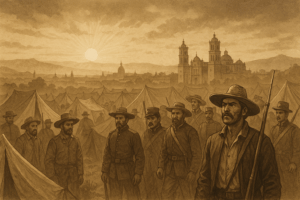 The noise and chaos of battle gradually gave way to a more focused struggle in pockets of intense combat. In these moments, every soldier’s story intertwined with that of their comrades. The air was thick with a mix of valor and sorrow, as friends fought shoulder-to-shoulder and sometimes made the ultimate sacrifice for the promise of tomorrow. Amid the pain, there was beauty—a beauty in the form of a shared belief that life, with all its peril and wonder, was worth defending at any cost.
The noise and chaos of battle gradually gave way to a more focused struggle in pockets of intense combat. In these moments, every soldier’s story intertwined with that of their comrades. The air was thick with a mix of valor and sorrow, as friends fought shoulder-to-shoulder and sometimes made the ultimate sacrifice for the promise of tomorrow. Amid the pain, there was beauty—a beauty in the form of a shared belief that life, with all its peril and wonder, was worth defending at any cost.
As the French began to falter, disoriented by the unexpected resilience and tactical ingenuity of their adversaries, hopes soared high across the Mexican lines. The battle, once seen as an insurmountable challenge, now transformed into a beacon of possibility—a tangible sign that even when the odds are terminal, the human spirit can defy destiny.
## IV. After the Storm: The Legacy of Valor
When the dust finally settled over the blood-streaked fields of Puebla, it was clear that history had taken a dramatic turn. The thorough defeat of the French forces was not merely a military victory—it was a reawakening of national pride and identity for Mexico. Although the toll of battle was immense, the victory resonated far beyond the confines of a single day’s conflict.
For the survivors, and for those who would come to hear of the day’s events, the Battle of Puebla symbolized the triumph of the underdog, a moment when a small but steadfast force rewrote the narrative of oppression. In the days that followed, the story of the courageous stand at Puebla spread like wildfire, eventually morphing into the internationally celebrated Cinco de Mayo—a day that has come to embody the ideals of resilience, determination, and the relentless quest for justice.
In the quiet after the battle, amid the wounded and the fallen, medals of honor were later struck in memory of the valor displayed. The relics and memoirs of that day are kept as sacred reminders of the sacrifice and unity that defined a turning point in history. For many, these tokens are not just artifacts but testimonials that celebrate what can be achieved when a community unites behind the common cause of freedom.
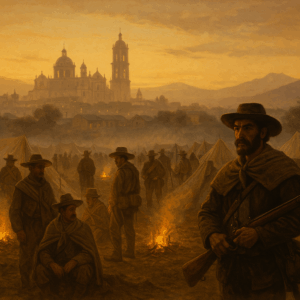 In time, the story of Puebla became a timeless lesson—a lesson that resonated across continents and generations. The message was clear: in moments of overwhelming odds, it is not the abundance of resources that decides one’s fate, but the strength of one’s resolve. The determination that had driven those soldiers to stand firm in the face of a mighty empire became a universal symbol of hope—a reminder that every individual, no matter how small their voice, has the power to change the course of history.
In time, the story of Puebla became a timeless lesson—a lesson that resonated across continents and generations. The message was clear: in moments of overwhelming odds, it is not the abundance of resources that decides one’s fate, but the strength of one’s resolve. The determination that had driven those soldiers to stand firm in the face of a mighty empire became a universal symbol of hope—a reminder that every individual, no matter how small their voice, has the power to change the course of history.
As the country slowly began to heal, the fields of Puebla, once the stage for a monumental conflict, now whispered tales of bravery in the soft murmur of the wind. The legacy of that historic morning and its transformative victory remained enshrined in every celebration, every remembrance, stirring the hearts of all who understood that freedom is never easily won, yet worth every sacrifice.
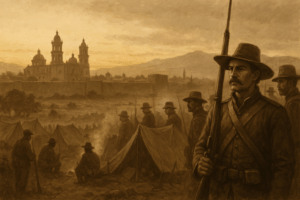 ## V. From History to the Heart of Today
## V. From History to the Heart of Today
Fast forward over a century and a half—the echoes of that fateful May 5 are not confined solely to the annals of Mexican history. For a person living in a bustling metropolis on any continent—from the high-rise streets of New York to the ancient alleyways of Istanbul—the lessons from Puebla are timeless and universally applicable. Consider Ana, for example, a young professional in a busy modern city. Amid the pressures of a competitive career, the daily grind of urban life might sometimes feel as overwhelming as the advanced armies that once loomed over Puebla.
Just as the soldiers of 1862 found their strength not in might but in resolve, Ana discovered that her personal battles—whether career setbacks, personal losses, or the persistent hum of self-doubt—were challenges that could be met with courage and unity. The story of Puebla teaches us that often, our vulnerabilities can be transformed into our greatest strengths when faced with adversity. It is a testament to the idea that even in the most daunting circumstances, a single act of perseverance can spark a chain reaction of change.
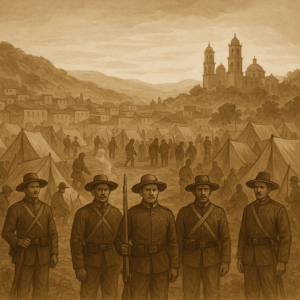 By internalizing the lessons of the battlefield, Ana learned to channel her inner fortitude. She gathered her community, much like General Zaragoza had rallied his troops, and nurtured an environment of mutual support and determination. Whether it was pioneering fresh ideas at work or volunteering to help in local initiatives, she applied the resilient spirit of Puebla to transform challenges into opportunities. Her story, in essence, becomes a microcosm of the timeless message: true change begins with an unwavering belief in oneself and the courage to stand up in the face of adversity.
By internalizing the lessons of the battlefield, Ana learned to channel her inner fortitude. She gathered her community, much like General Zaragoza had rallied his troops, and nurtured an environment of mutual support and determination. Whether it was pioneering fresh ideas at work or volunteering to help in local initiatives, she applied the resilient spirit of Puebla to transform challenges into opportunities. Her story, in essence, becomes a microcosm of the timeless message: true change begins with an unwavering belief in oneself and the courage to stand up in the face of adversity.
The legacy of Puebla is not merely etched in the pages of history—it lives on in the daily actions of modern individuals who dare to challenge the status quo. It reminds us that our struggles are part of a larger human narrative, one that transcends time and geography. Whether you are a budding entrepreneur, an artist seeking expression, or simply a person striving to make a difference in your community, the resolute spirit of those who fought on May 5, 1862, offers an endless reservoir of inspiration.
## VI. The Enduring Message: Courage, Unity, and Renewal
Drawing the threads of history into our modern tapestry, we find that the spirit of May 5 serves as a guiding light for anyone willing to embrace resilience in the face of personal battles. The courageous stand at Puebla is more than a tale of military triumph—it is an enduring reminder that every setback can be transformed into an opportunity for profound personal and collective renewal.
For every individual, the lesson is simple: when the odds seem insurmountable, draw upon the reservoir of inner strength, rally your community, and push through the challenges. Just as the Mexican soldiers transformed fear into a steadfast commitment to freedom, so too can each of us harness our vulnerabilities to forge a path toward a brighter future. In our battles—whether they occur within the boardroom, in the corridors of education, or in the quiet silence of our inner dilemmas—our actions can ripple out to create transformative change.
Today, the image of that courageous morning in Puebla stands as a testament to the power of unity and resolve. Its lessons are universal, reverberating with renewed relevance whenever we encounter obstacles. The memory of those brave souls continues to inspire millions around the world, illuminating the idea that even the mightiest challenges can be overcome with a resolute heart and a dedicated community.
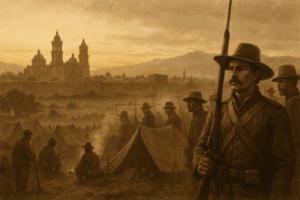 ## Epilogue: Weaving History Into Daily Life
## Epilogue: Weaving History Into Daily Life
In the soft glow of an urban dusk, when the noise of the city slows to a contemplative lull, one might reflect on the lessons of away, long-ago days when courage was the only viable choice. The battle of Puebla—the triumph of a resolute few against overwhelming odds—reminds us that every moment is an invitation to channel our inherent strength. Whether you are wandering the busy avenues of a modern metropolis or seeking solace in the quiet corners of a village, the lessons of this historic day offer a blueprint for transformation.
Imagine, for a moment, that the spirit of Puebla flows within you. Every challenge you face—a difficult conversation, a daunting project, a lonely night—becomes a chance to live the legacy of resilience and determination. You might find yourself rallying your friends, just as those united soldiers did, or boldly venturing toward a goal that once seemed unreachable. In every such moment, the echoes of those brave souls remind you that adversity, though fearsome, is but a precursor to the possibility of renewal and ultimately, victory.
Thus, the story of May 5, 1862, transforms into more than a historical account—it becomes an ever-present inspiration. The valor of a long-ago battlefield intertwines with the fabric of modern life—a tapestry where every individual can add their own brilliant thread. In every act of perseverance, every decision made in the face of fear, lies the promise of a brighter, freer tomorrow.
May this tale, imbued with the passion of a defiant past and the hope for a resilient future, serve as a beacon. For in the grand continuum of history, it is not the mere passage of time that matters, but the enduring spirit that guides us, challenges us, and ultimately defines our humanity.
*As you close this narrative, consider how the resolute spirit of Puebla might inspire your own journey. Draw upon its vivid imagery and timeless lessons whenever obstacles arise, and remember that every challenge you face is an opportunity to write your own story of courage and hope.*
In summary, the events of May 5, 1862, remind us that even when confronted by overwhelming odds, the human spirit is capable of extraordinary feats. Whether facing a personal crisis, striving toward a professional breakthrough, or simply seeking to ignite a spark of change in your community, the legacy of those brave souls in Puebla assures us that perseverance, unity, and self-belief can transform daunting challenges into stepping stones toward a richer and more fulfilling life.
*Feel free to let the echoes of that distant history fuel your present ambitions. Every time you face a challenge, remember that you are part of a never-ending chain of humanity’s boldest acts. The same spirit that lit up a battlefield on a long-ago May morning now emboldens you to conquer your own battles, making every day a new chapter in the epic of life.*

